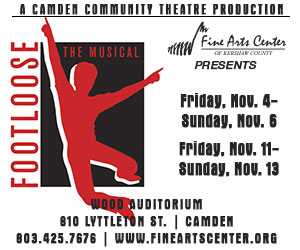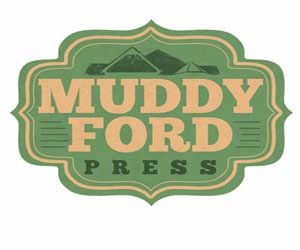Jay Matheson and the Jam Room
By Kyle Petersen
The situation in which you first see Jay Matheson will invariably color how you think about him. Maybe the first time you met him was long ago when he was that thin, quiet, bespectacled punk rocker mixing the sound at a local show. Or maybe you saw him play bass in Bachelors of Art, one of the great Columbia bands of the late 1980s, which mixed metal, progressive rock, and pop hooks in a way that still seems surprising. Maybe you saw him wearing a cowboy hat and backing up one of the most rambunctious country-rockers in the Southeast, Hick’ry Hawkins. Perhaps you even saw him dressed up like a member of Sergeant Pepper’s band as part of the queer-metal outfit Confederate Fagg, blasting through an imperfect-but-brilliant rendition of the guitar solo at the end of Lynyrd Skynyrd’s “Free Bird.”
Context is everything.
For most local, regional, and national musicians, though, the image of Matheson that sticks in their minds is that of the tireless recording studio owner/engineer/producer hunched behind the mixing board. Over the course of 25 years of running the Jam Room Studios, Matheson has made literally thousands of recordings for a variety of local, regional, and national acts, at (often) the cheapest rates in town. The story of Columbia’s underground music scene, in so many ways, runs through the doors of Jay Matheson’s recording studio.
Sitting down with Matheson on an average Friday morning, the veteran recording engineer is feeling a bit weathered. He’s come in early to listen and work on his recording session from the day before and is both excited by his work and feeling a little chagrined about what happens with the fruits of his efforts after he’s done. “We need to crack the whip on some of these local dudes,” he laments. “It’s all a matter of self-image. I’m way more concerned about how this sounds than they are!”
Gripes aside, though, the overwhelming sense you get from Matheson is a considerable amount of pride in what he has accomplished. When he started recording bands in the mid-1980s, he would show up at their practice space with his sound board from mixing live shows and a borrowed reel-to-reel four-track. Today, the Jam Room boasts a heady equipment list and both vintage analog and state-of-the-art digital recording tools, a combination which draws such people as Kylesa guitarist and sought-after metal producer Phillip Cope to make the Jam Room their home recording studio.
Of course, Matheson was a musician first, and has a laundry list of bands he has played in over the years, most notably the should-have-been-famous progressive rock band Bachelors of Art (also known as B.O.A.) in the late 80s and the queer-glam craziness of Confederate Fagg through much of the 2000s. Even before B.O.A., he made waves in what was “one of the earliest metal bands in Columbia,” Tempest Fugit. In between those groups, Matheson did stints with Hick’ry Hawkins, Wild Root, The Headnecks, The Void, 6-9 Split, and countless others, primarily as a bass player. Today, he mostly plays in Capital City Playboys, a highly energetic rockabilly band, and Buck Stanley, a retro-country outfit, both of which are among the highlights of the city’s music scene.
The way Matheson tells his story, though, his rock and roll life was rather unlikely. “I came from a Southern Baptist sort of background,” he says. “My parents didn’t like the whole idea of rock music, so I had to push everything under the radar.” Growing up in the 1970s at a time when bands like Kiss and Jimi Hendrix were anathema to straight-laced families like his made for an interesting early exposure to music – one of his earliest memories of music was Herb Albert and the Tijuana Brass LPs that his parents got from a record club.
Still, Matheson was hooked. “I would dance around playing an imaginary trumpet,” he recalls. He eventually picked up the trumpet in middle school and high school, but his heart was quickly torn away by the “smokin’ hot solos” of groups like Black Sabbath and Motorhead. Primarily a bass player, Matheson only picked up the guitar when Confederate Fagg formed out of a drunken late-night jam that “was horrendous – we just sounded terrible,” he laughs. “I was sort of forced to learn [the guitar] that way.”
Metal was always his first love, but Matheson remembers becoming disenchanted with it as the 80s progressed. “I got out of it because metal was going in a weird direction … all of a sudden hair metal and all that was happening and I didn’t really want to sign on to that,” he explains. B.O.A. became his main musical project from around 1988 to 1992, and the group became one of the preeminent regional bands in the Southeast, with prominent opening gigs for bands like Social Distortion and Concrete Blonde and a national distribution deal. “If I had known then what I know now,” he says ruefully. “We had massive local and regional popularity, but it didn’t turn into anything at all.”
As for his interest in country and roots music, Matheson thinks it had something to do with his upbringing. “Growing up in the South, I didn’t really like, say, old-timey country, but it was always on the radio. I just sort of passively listened to it and, in retrospect, it’s kind of the soundtrack to a part of my life,” he says. He’s quick to point out as well that he “only likes rootsy, gritty traditional stuff. I’ve never been known for working with [any kind of] pop music or anything like that.”
Even though B.O.A. had hoped to hit it big and its ending marked the end of a specific period of his life, Matheson has played a booming role in the music scene as a sound engineer. “I started out as a local freelance live sound engineer,” Matheson says. “I did all the heavy bands and all the punk shows for a long time. Bands like Henry Rollins, Bad Brains, and Faith No More.” Because he had the equipment and the expertise, all he had to do was get access to a four-track and he was good to go for recording. Starting with General Jack and the Grease Guns in 1986, (Matheson describes them as “a gothy, heroined-out New York Dolls”), Matheson gradually moved from live sound to recording when he began working at ACS Sound & Lighting, which limited his ability to do live sound but gave him access to top-notch equipment and expertise.
By the early 1990s, the Jam Room had become his full-time endeavor.
“I was drifting towards something to be a little more full-time and stable,” Matheson explains. The first few years he had a physical studio space, though he didn’t even have a business license. “I was financing things with a $1500 credit line from the over-drafting service on my checking account,” he recalls. He started out with not much more than the equipment needed for live shows and bounced out from locations on North Main and Huger Street to his present location off Rosewood Drive, but gradually built up his equipment inventory to the enviable level it is today. Starting out in 1987 with his first 8-track, Matheson made his name recording ground-breaking records by local punk bands like Antischism, In/Humanity, and Bedlam Hour who built national reputations. “People were coming from all across the country to try and capture the sound [of Antischism],” he remembers, and the studio cemented its reputation as a great place for punk rock recordings, in addition to recording a wide variety of other local music.
The Jam Room also has a strong reputation for metal music owing not only to Matheson’s experience with the genre, but also with the presence of Phillip Cope, who has brought metal bands from all over the world to the studio. Bands like Sierra, Kylesa, Baroness, and Black Tusk have all clocked time at the Rosewood studio.
Of course, the high quality of equipment means that diverse artists from all over the spectrum have ultimately recorded at the studio, from hip-hop and country to blues and Christian rock bands. Such big names as Band of Horses and Big Boi (of Outkast) have also recorded there as well, lending the studio a reputation as a group of professionals who can handle even the most demanding of clients.
As the years progressed and the music industry went through its various revolutions, the Jam Room attempted to keep pace. “We went full digital about 8 or 9 years ago [with Pro Tools],” Matheson says. “It was hard because I’m not really a computer nerd.” The studio has suffered some from the advent of at-home digital recording, but the veteran engineer is quick to point out that the studio still offers the best sound.
“Homemade recordings are never really even gritty, they are just kind of flat,” he explains. “The quality of their mic pre-amps and analog-to-digital conversion just flattens the sound. It gets compressed in a really unfriendly way.” He compares it to photography, where high-quality cameras and files means less pixilation and more texture and detail.
The other issue he recognizes is that musicians often think the studio is too big a step. “People have all these different options to record [now], and I don’t always get a chance to talk to people before they decide [to go a different way],” he says. “If we can talk about, and if [the band] can each get 50 bucks a piece together, we can do a few demos and it will sound a lot better than some of the stuff I’ve been hearing.”
Still, Matheson’s solid reputation across different communities means that the Jam Room stays busy. In a given few weeks, the studio’s projects include mixing the audio of an upcoming Martha & the Vandellas DVD, a recording stint with Canadian metal band Sierra, odd-hour sessions for a semi-regular Jam Room compilation series (this one features two original songs from Columbia bands The Fishing Journal and Sons of Young, along with the upstate-based Mason Jar Menagerie and Charlotte’s Lamb Handler), and the initial sessions for a local collaborative folk group called The Hollerin’ River Talkers, which is being spearheaded by Shallow Palace front man Greg Slattery and features Marshall Brown, Daniel Macado (The Restoration), Todd Mathis (American Gun), and Jake Garrett (Mason Jar Menagerie).
Sitting around the Jam Room on a Friday morning doesn’t feel particularly glamorous, but there is also an undeniable sense of something in the air, as if the millions of notes and rhythms played in these few rooms over the years have soaked in the walls and become, in their own way, a part of music history. And while Matheson started this morning at a decidedly un-rock and roll hour and has given up dreams of stardom, it’s hard not to look at him and redefine your notions of what a “rock and roll lifestyle” is. He lives and breathes a life filled constantly with new sounds, new projects, and new ideas.
And he makes it all sound better. How’s that for a rock and roll?






.jpg)
